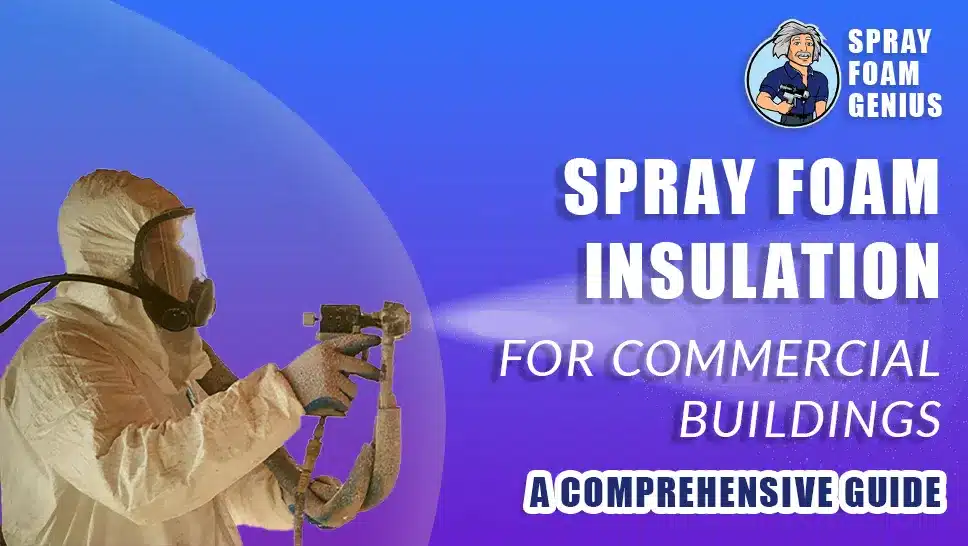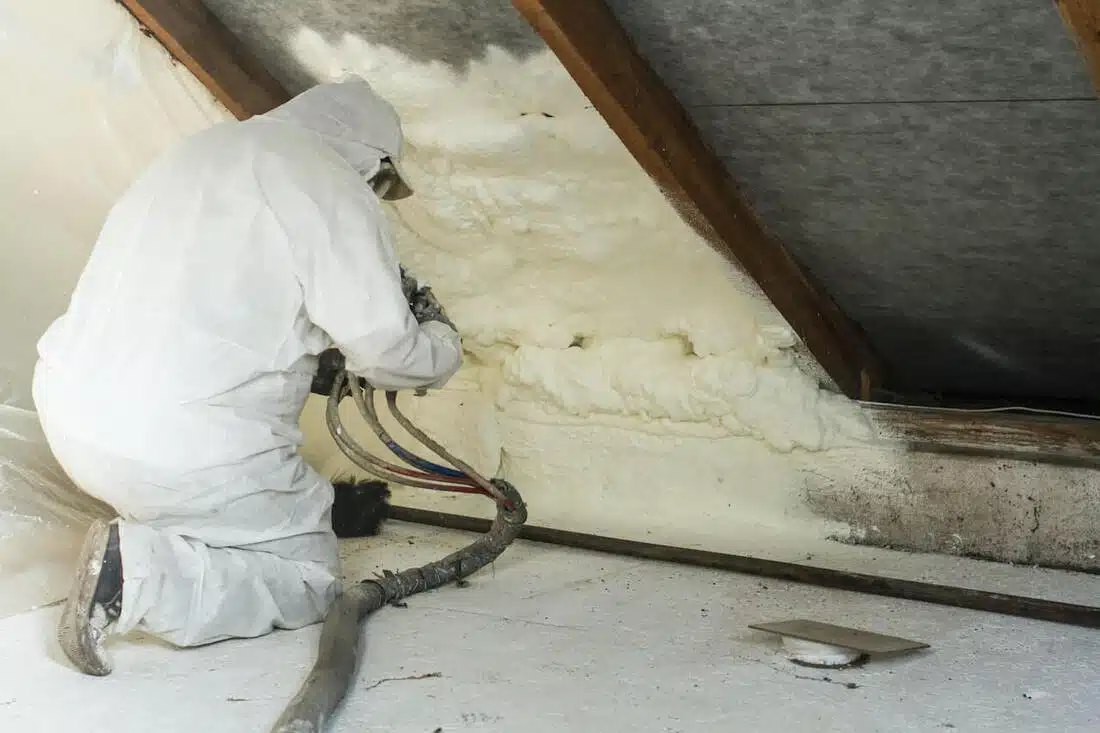
In the world of commercial construction and renovation, insulation is more than just a building component; it’s a vital element that ensures energy efficiency, structural integrity, and long-term sustainability. Among the myriad of insulation options available, spray foam insulation stands out as a superior choice for commercial buildings. It offers unparalleled benefits in energy savings, durability, and adaptability. In this comprehensive guide, we will delve into the intricacies of spray foam insulation, exploring why it’s the preferred choice for commercial applications and how it can enhance your projects.
Understanding Spray Foam Insulation
What is Spray Foam Insulation?
Spray foam insulation is a versatile insulation material made by combining two chemical components: isocyanate and polyol resin. When these two substances mix, they react and expand up to 60 times their liquid volume, forming a solid, airtight layer. This material can be applied to walls, ceilings, and other surfaces in both new constructions and retrofitting projects.
There are two main types of spray foam insulation: open-cell and closed-cell. Each type has distinct properties, making them suitable for different applications in commercial buildings.
- Open-Cell Spray Foam: This type of spray foam has a lower density and is more flexible. It’s ideal for interior applications where soundproofing is a priority. Open-cell foam is also more affordable, making it a cost-effective solution for many commercial projects.
- Closed-Cell Spray Foam: This is a denser, more rigid form of spray foam that provides a higher R-value (a measure of insulation effectiveness) per inch. Closed-cell foam is perfect for exterior applications and areas where moisture resistance is crucial. Its structural strength also adds to the building’s overall durability.
Why Choose Spray Foam Insulation for Commercial Buildings?
Commercial buildings have unique insulation requirements due to their size, structure, and usage patterns. Spray foam insulation meets these demands with several key advantages:
- Energy Efficiency: Spray foam insulation creates an airtight seal, significantly reducing energy loss through walls, roofs, and other building components. This leads to lower energy bills and a reduced carbon footprint, which is increasingly important for businesses aiming to meet sustainability goals.
- Moisture Barrier: One of the biggest challenges in commercial buildings is moisture control. Closed-cell spray foam acts as a vapor barrier, preventing moisture from seeping into walls and causing mold or structural damage.
- Soundproofing: Open-cell spray foam is excellent for reducing noise pollution, which is a significant concern in commercial spaces like offices, hospitals, and schools. It absorbs sound waves, creating a quieter, more comfortable environment.
- Longevity and Durability: Spray foam insulation doesn’t sag or settle over time, maintaining its effectiveness for decades. This long-lasting performance makes it a cost-effective solution in the long run, even if the initial investment is higher than other insulation types.
- Adaptability: Whether you’re dealing with complex architectural designs or retrofitting an older building, spray foam insulation can be applied to a variety of surfaces and irregular shapes, ensuring comprehensive coverage and minimal thermal bridging.
Applications of Spray Foam Insulation in Commercial Buildings
1. Roofing Insulation
Roofing is a critical area in any commercial building where energy loss can be significant. Spray foam insulation can be applied directly to the roof deck, providing excellent thermal resistance and waterproofing. It adheres to various roofing materials, creating a seamless barrier that protects against leaks, reduces heating and cooling costs, and extends the roof’s lifespan.
2. Wall Insulation
In commercial buildings, walls represent a significant portion of the surface area, making effective insulation crucial. Spray foam insulation can be applied to both exterior and interior walls. It helps maintain a consistent indoor temperature, reduces energy consumption, and improves the building’s overall thermal performance.
3. Foundation and Basement Insulation
Foundations and basements are often overlooked in commercial insulation projects, yet they are critical for preventing heat loss and moisture infiltration. Closed-cell spray foam is ideal for these areas as it provides a robust moisture barrier and adds structural strength to the foundation, reducing the risk of cracks and water damage.
4. Mechanical Room Insulation
Mechanical rooms house essential equipment like HVAC systems, boilers, and electrical panels. Insulating these spaces with spray foam helps maintain optimal operating conditions, reducing energy consumption and extending the lifespan of the equipment. It also helps in noise reduction, preventing the sound of machinery from disrupting other areas of the building.
5. Soundproofing in Sensitive Areas
Commercial buildings like hospitals, schools, and office spaces require effective soundproofing to create a peaceful environment. Spray foam insulation, particularly open-cell foam, is highly effective at absorbing sound and reducing noise transmission between rooms, enhancing the comfort and productivity of the occupants.
Benefits of Using Spray Foam Insulation in Commercial Buildings

1. Cost Savings
While the initial cost of spray foam insulation may be higher than traditional insulation methods, the long-term savings are substantial. The energy efficiency provided by spray foam can reduce heating and cooling costs by up to 50%. Additionally, its durability means that you won’t need to replace it as often as other types of insulation, saving on maintenance and replacement costs.
2. Environmental Impact
Spray foam insulation contributes to a building’s energy efficiency, reducing the overall carbon footprint. By lowering energy consumption, businesses can achieve higher sustainability standards, which is increasingly important in today’s environmentally-conscious market.
3. Improved Indoor Air Quality
Spray foam insulation helps to prevent the infiltration of allergens, pollutants, and moisture into the building. This results in improved indoor air quality, creating a healthier environment for employees and visitors. For commercial buildings like schools and healthcare facilities, this is particularly crucial.
4. Enhanced Structural Integrity
Closed-cell spray foam adds rigidity to walls, roofs, and other structural components, enhancing the building’s overall strength. This additional support can be especially beneficial in areas prone to extreme weather conditions, helping buildings withstand high winds, heavy rains, and other environmental stresses.
5. Quick and Efficient Installation
Spray foam insulation can be installed relatively quickly, minimizing downtime for commercial operations. It expands rapidly upon application, allowing for a fast and efficient installation process that doesn’t require a lot of labor or time.
Choosing the Right Spray Foam Contractor
Selecting the right contractor for your spray foam insulation project is crucial to ensuring that you get the maximum benefits. Here are some tips to help you choose the best contractor:
1. Experience and Expertise
Look for contractors who specialize in spray foam insulation for commercial buildings. They should have a proven track record of successful projects and a deep understanding of the unique challenges and requirements of commercial insulation.
2. Certifications and Licenses
Ensure that the contractor is licensed and certified to perform spray foam insulation. Certifications from recognized industry organizations can be a good indicator of their professionalism and adherence to best practices.
3. References and Reviews
Ask for references from previous clients and check online reviews to gauge the contractor’s reputation. A contractor with positive reviews and satisfied customers is more likely to deliver quality work.
4. Warranty and Support
A reputable contractor should offer a warranty on their work and provide ongoing support if any issues arise after installation. This warranty is a testament to their confidence in the quality of their services.
5. Competitive Pricing
While cost shouldn’t be the only factor in your decision, it’s essential to get competitive quotes from multiple contractors. This will give you an idea of the market rate and help you choose a contractor who offers the best value for your investment.
Take the Next Step with Spray Foam Genius Marketing
Spray foam insulation offers unparalleled benefits for commercial buildings, from enhanced energy efficiency to improved structural integrity. However, achieving these benefits depends on choosing the right contractor. At Spray Foam Genius Marketing, we specialize in helping spray foam contractors grow their businesses through targeted marketing strategies, including Professional SEO, Local SEO, Website Development, and Lead Generation. We understand the unique challenges of the spray foam industry and are here to support you every step of the way.
Ready to take your business to the next level? Call us at 877-840-FOAM for USA and 844-741-FOAM for Canada visit our website at sprayfoamgeniusmarketing.com, or email us at [email protected] to get started.
Let’s work together to make your spray foam insulation business a success!
- 5 Google My Business Hacks to Double Your Leads for Spray Foam Insulation Contractors - January 14, 2025
- Why Spray Foam Contractors Cannot Ignore Reputation Management in 2025 - January 13, 2025
- Local SEO Secrets Every Spray Foam Contractor Must Know to Win in 2025 - January 13, 2025

